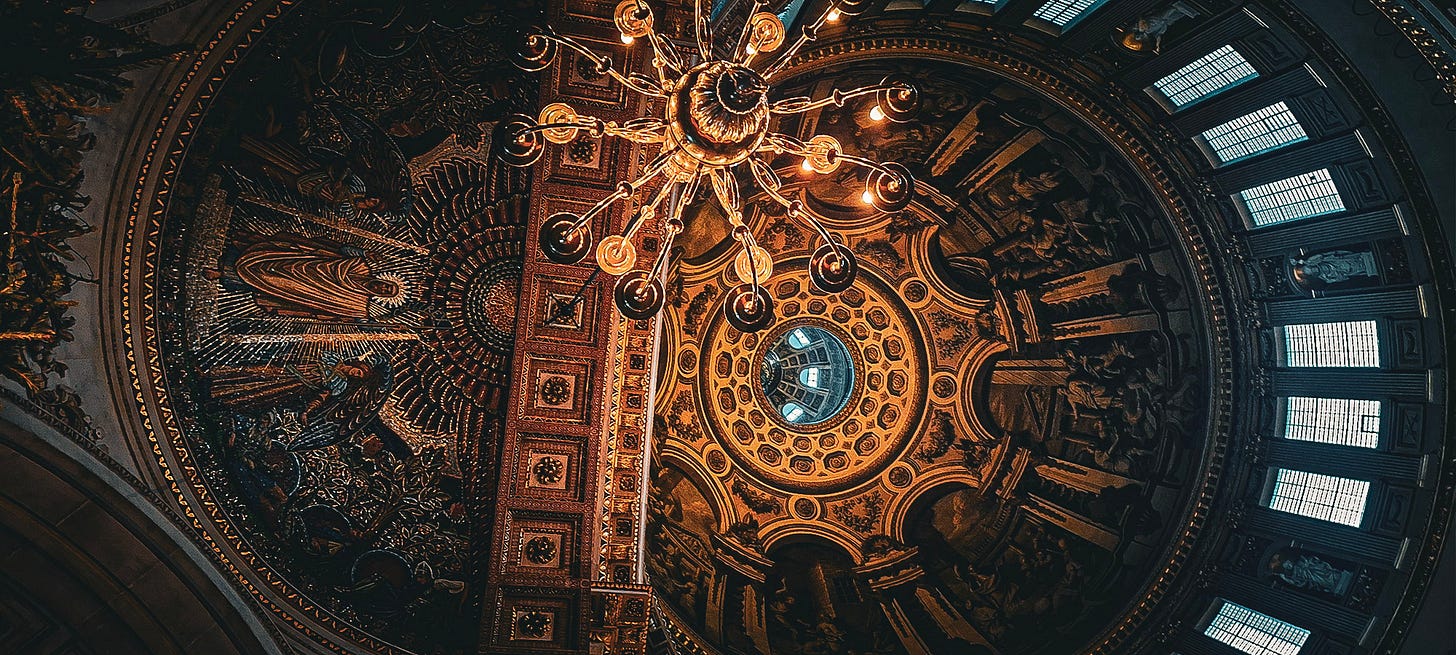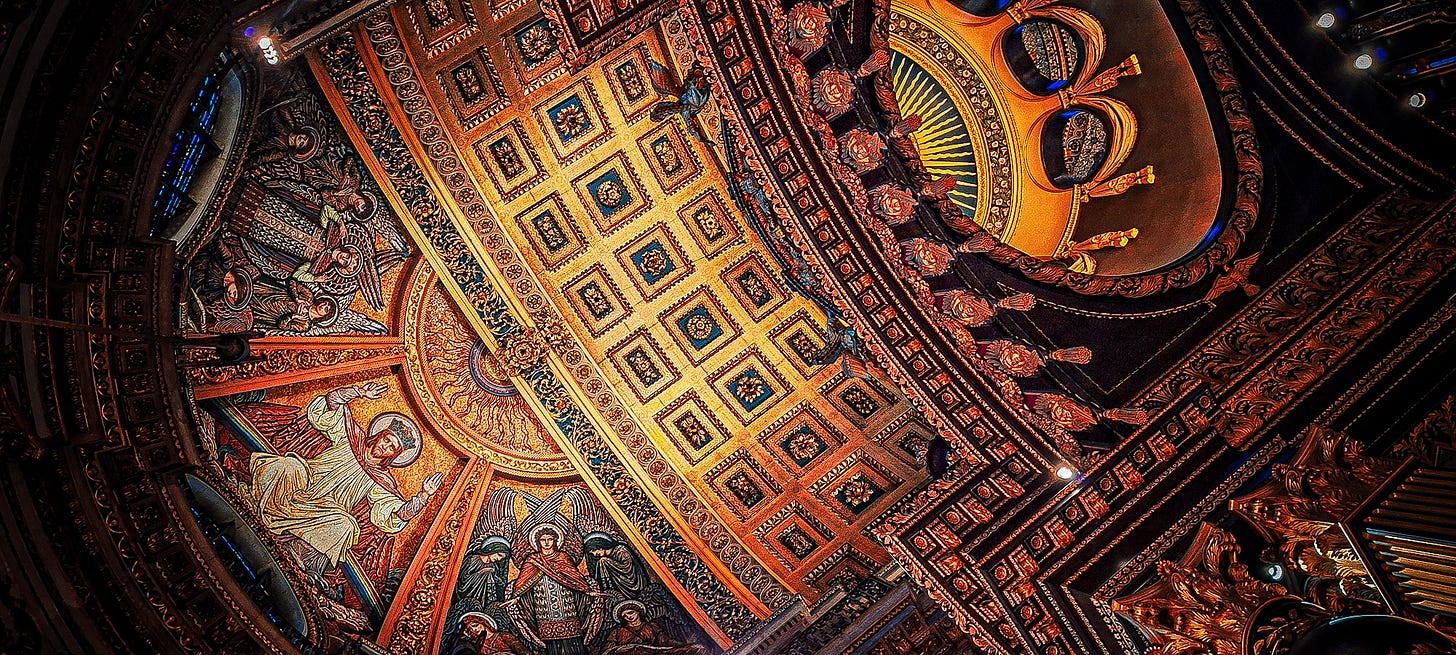insanity clause
Meditation on the glorious and ineffable fall of the second person of the Holy Trinity
One of my earliest memories of England is sitting alone in the chapel of Magdalene College, Cambridge, listening to an organist run through his paces. I happened to drop in during practice time. He was sitting high up in the organ console and probably didn’t see me, but the powerful pipe sounds filled the small chapel, shivered the wooden stalls, and reverberated in my chest.
I can’t remember hearing organ music again until last Sunday when I attended an Advent season playing of Olivier Messiaen’s nine-part meditation, La Nativité du Seignur (The Nativity of Our Lord), at St. Paul’s Cathedral in London. St Paul’s is a much bigger setting than the chapel at Magdalene and, at first, I’m disappointed by how the Grand Organ’s sound fails to fill the cavernous space. Over the music, I hear the rustling of people around me, including the echoey tiptoe of tourists getting up to leave having discovered that what appears to be over an hour of dulcet organ tones is not really their speed. I lean in to get something like the full sound effect.
The softness of the first three meditations under St. Paul’s soaring dome emphasizes the quietude and emptiness into which Jesus unexpectedly descends. In these meditations, the tenderness of the Virgin Mother gazing at her newborn and the silent adoration of the shepherds flow along the seamless lines of an eternal mystery drawn quietly on history’s pages. From the altar, the smoke from burning incense wafts incandescently upward.
Any step into St. Paul’s Cathedral is an instant refuge from the hustle of London, especially during the holidays. But this specific time and specific place with a couple hundred others shut inside this sanctum to meditate on the Incarnation makes me ponder how unoften we choose to retreat from the insanity of the world.
Sometimes the insanity of personal demands, work deadlines, and life developments is unavoidable. Often, the news of the day, or of the hour, infringes on our lives in ways we cannot escape. But there are times when we subject ourselves to a bustle that we don’t really need to bear.
This is a precious thought during Christmastime, chock full of dinners, parties, gift-givings, and other invitations and opportunities we’d be remiss to pass over. This invitational aspect is what, in my opinion, gives the season its festive quality. We simply must get together and celebrate because it’s the holidays and the year’s about to run out. We fail somehow if we don’t. But, often, our celebrations are bracketed by the rush of travel and stress and worry. My own have been, certainly, this year.
The near-delirium of needing to be everywhere and attend to everything all at once sometimes prevents us from seeing anew the ancient and unexpected. Divine fingers directed a riotous symphony, one for which the world fortunate enough to receive it was unprepared. Those ancients had their own insanity to contend with: census and immigration, taxes and military occupation.
Funny how all that still concerns us now. The insanity never ends. It’s only interrupted by a deeper, more turnstile insanity. That of God admitting a single person, the Ur-being, into finitude as an infant. Then, as now, it’s easy to miss. It’s a pause in the music we’re eager to skip past. It’s a clause in the death sentence bequeathed to us by sin, a subject and verb that turn the story on its head.
It’s this insanity that proves our own momentary manias less important. But only if we have ears to hear. Hence my gratitude for the cocooning effect of La Nativité at St. Paul’s. The chromesthesiac composer’s attempt to tell the whole of the Incarnation nearly lulls one to sleep in its first volume, then startles one awake with the “terrible fortissimo” of its second. Sit up. Pay attention. Glory to God in the highest.
I am taken away, almost hypnotized by the chords. Scripture reading between each meditation centers my focus. “Sacrifices and offerings you have not desired, but a body you have prepared for me.” The Ur-being, the limitless limit of all that is, is poured into a mold of flesh about nineteen to twenty inches long, weighing only seven or eight pounds. The incandescence of infinite galaxies rush like melted fire through tiny capillaries. This was God’s idea.
A girl, about eight or nine years old, sits with an older woman in the row ahead of me. As Messiaen’s triumphant final meditation begins, she turns from the organ and the altar to the plain, wooden nativity set up in front of the podium. Her eyes follow the smoke from the incense up to the dome where it curls and spreads, stretching itself like a holy spirit over the silent crowd. Her eyes are wide with fascination.
“This is insane,” she whispers.
…thou, O Lord, art in the midst of us sinners,
and thy holy name is named upon us;
forsake us not, O God,
but at the last day vouchsafe to set us among thine holy and elect…1
Magdalene College, Cambridge, Evening Prayer
This subtitle of this post comes from the notes in the program, attributed to David Gammie.



